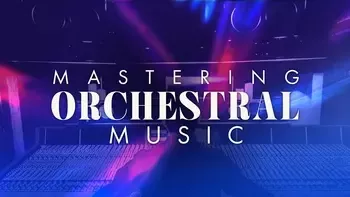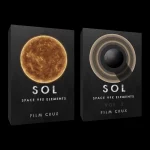Cinematic Composing.com Mastering Orchestral Music You know the feeling.
You know the feeling.
You’ve spent way too many hours getting a really sweet mix on your new orchestral track and you’re pretty happy with the result so you bounce it down and take a break for a while so you can listen to it later with fresh ears.
You come back to the studio, cue up a few tracks from your favorite composers of a similar style and press play. And your face drops.
What’s happening here?
The track you were so proud of just a few hours ago suddenly sounds completely amateurish. It’s got a ‘harshness’ to the upper mids and a ‘muddy’ build-up in the lower mids. It seems to have no width to it, it sounds bland.
And worst of all it’s so much lower in volume than the pro tracks you’re comparing it to.
What went wrong?
It’s Time For A Master Touch
Take heart my friend. All is not lost!
Think about it for a minute. You’re trying to compare a track that you probably created and mixed all by yourself with tracks that have been mixed to a very high standard (possible by a dedicated mix engineer) and then ‘mastered or polished’ to give them the most impact and sparkle!
Provided your track is well mixed, there is a very strong possibility that after you’ve given it a bit of careful tweaking, your track will once again bring a big smile to your face.
Meet your trainer
Marc Jovani, Composer, Teacher, Cofounder of Cinematic Composing
Based in Los Angeles. Has composed soundtracks for more than 50 movies
Has provided music for major studios such as NETFLIX, Amazon, Lionsgate, Syfy, FOX.
His movies have been distributed internationally on leading, nationally broadcasted television channels, including Lifetime (USA), TF1 (France), the Hallmark Channel (USA), Canale 5 (Italy), Antena 3 (Spain), HBO (USA) and more.
His music has been recorded in major studios: Warner Bros (Burbank), EastWest (Hollywood), and others.
Co-founder of Cinematic Composing (2016) with more than 10.000 students and growing
Berklee College of Music: Composition & Orchestration teacher at Berklee (2010-2016)
What You’ll Learn
1. Mastering:
– An Overview – Learn what ‘mastering’ actually is and develop an understanding of what exactly you are trying to achieve with your own tracks.
2. The Mastering Chain:
– Here you’ll discover what elements you’ll need to give your track the sparkle and punch it needs to compete with ‘pro’ productions.
3. Analogue Saturation:
– To ‘warm it up a bit’ and help it sound a bit more organic.
Equalization
– To identify and either ‘carve out’ or ‘support’ the problem areas of the finished mix.
Exciter
– To give a bit of extra sparkle if it’s needed.
Dynamics
– To ‘level out’ any noticeable peaks and troughs that will make your track sound bumpy and amateurish.
4. Imager:
– To help give your track a greater feeling of width and space.
5. Maximizer:
– To ride the outputs of your mix and make sure it is always ‘present’ and ‘impactful’
6. Automation:
– Learn how automation can bring a more human ‘feel’ to orchestral tracks as it emulates the changing dynamics of real players.
The curriculum
Explore Mastering Orchestral Music
In this course, you will learn what finishing touches need to be considered to ensure your track compares well to professionally released tracks.
Available on your Personal Computer, Tablet & Smartphone.
You’ll learn what tools you’re going to need to achieve a polished and professional sound and you’ll also learn how to use those tools and set them up to get a great result for your own tracks.
Modules includes in this course
MODULE 1. Mastering
Introduction
Mastering – Overview
Mastering – EQ
Mastering – Analog Saturation
Mastering – Exciter
Mastering – Dynamics
Mastering – Imager
Mastering – Maximizer
Mastering – Automation
Mastered Track
Bonus Video – Mastering with standard (non UAD) plugins
Homepage:-https://www.cinematiccomposing.com/masteringorchestralmusic




![Sean Divine Vocal Chains SR v1.8 [UPDATED]](https://www.goaudio.net/wp-content/uploads/2025/10/Divine-Mixing-Vocal-Chains-SR-Updated-Box-Render-150x150.webp)



![Toontrack LATEST MIDI PACK [APRIL 2025]](https://www.goaudio.net/wp-content/uploads/2025/04/Toontrack-LATEST-MIDI-PACK-APRIL-2025-150x150.png?v=1745120673)
![Toontrack LATEST MIDI PACK [MARCH 2025]](https://www.goaudio.net/wp-content/uploads/2025/03/Toontrack-LATEST-MIDI-PACK-MARCH-2025-150x150.png?v=1743055485)

![Toontrack NEW RELEASED MIDI [FEB 2025]](https://www.goaudio.net/wp-content/uploads/2025/02/gandr-collage-3-150x150.jpg?v=1740710859)

![Toontrack LATEST RELEASES MIDI BUNDLE [DEC 2025]](https://www.goaudio.net/wp-content/uploads/2024/12/toontrck-2024-150x150.png?v=1733532112)




![Toontrack Hollowbody EBX [WIN+MAC]](https://www.goaudio.net/wp-content/uploads/2024/09/Toontrack-Hollowbody-EBX-150x150.png?v=1726103695)
![Toontrack LATEST RELEASES MIDI BUNDLE [SEP 2024]](https://www.goaudio.net/wp-content/uploads/2024/09/gandr-collage-11-150x150.jpg?v=1725764744)
![Blockbuster Sound Sand Dune & Mockingbird [BUNDLE]](https://www.goaudio.net/wp-content/uploads/2024/08/blockbuster-sound--150x150.png?v=1724378090)
![Blockbuster Sound Mermaids Sirens & Horror Pack [BUNDLE]](https://www.goaudio.net/wp-content/uploads/2024/08/Blockbuster-Sound-150x150.png?v=1723854097)







![Initial Audio XO – Heat Up 3 Expansion [WIN+MAC]](https://www.goaudio.net/wp-content/uploads/2022/10/XO-–-Heat-Up-3-Expansion--150x150.png?v=1666064730)


